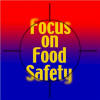Home - JCTD Home - Operations Directorate - QUAD - Public Health

Public Health
Mission
 GENERAL: The Public Health Officers consists of the Environmental Science & Engineering Officer (ESEO) and the Senior Food Protection Officer. These officers are responsible for the Force Health Protection issues that impact the Army Food Service Program. These officers are located in the Operations Directorate, Quality Assurance Division.
GENERAL: The Public Health Officers consists of the Environmental Science & Engineering Officer (ESEO) and the Senior Food Protection Officer. These officers are responsible for the Force Health Protection issues that impact the Army Food Service Program. These officers are located in the Operations Directorate, Quality Assurance Division.
Responsibilities
As liaisons to the Public Health Command, the ESEO/Food Safety Officer and the Senior Food Protection Officer serves as the environmental health sciences and veterinary food sciences consultant to the Quartermaster General, and the Directors within the Joint Culinary Training Department.
They are responsible for food safety, food defense, quality assurance, wholesomeness, and sanitation activities. They advise and provide input to the development of new food protection concepts, regulations, policies and training programs that directly impact the Army Food Service Program. Reviews and evaluates policy guidance, assists in epidemiological investigations, assesses and identifies training needs. Provides comprehensive plan reviews for environmental, health, and engineering controls of food service equipment and facility design. Provides management assistance to major commands as subject matter experts from basic to advanced food safety and defense issues.
Why Study Food Safety?
It is essential that personnel who work in food service operations understand the importance of safe food handling. As food service specialists, you are tasked with the considerable responsibility of feeding Soldiers or Marines in a garrison or field environment. Untrained and uneducated food service workers pose the greatest threat in the food service industry. It is imperative that you understand the important role of food safety in food service operations. Although quality food (looks, smells, and tastes good) is important, the safety of the food must take priority.
Understanding the importance of food safety is the beginning of a successful food safety program. The ultimate goal is to protect the Soldiers and Marines, who will eat the food that you prepare in your dining facility. You will more than likely consume the food that you prepare for your fellow Soldiers and Marines. A foodborne illness contracted by any military personnel can drastically hinder mission accomplishment.
Foodborne Illnesses
Foodborne illnesses rarely get reported because the signs and symptoms are closely related to that of the flu. Most personnel dismiss the illness as the “24 hour flu”. The term that describes this magnitude of this problem is known as the “Iceberg Theory”. In comparison to what we see of an iceberg, symptoms of a food borne illness only reflect 10% of the problem. The other 90% of the problem, causing the most damage, goes unseen. The only way that a food borne illness can be accurately diagnosed is with a laboratory analysis of the individual’s feces, vomit or suspected food that caused the illness.
JCTD ESEO can assist you in providing guidance and assistance in the following:
- Food Sanitation and Safety
- Public Health Sanitation
- Weather Injury Prevention
- Water Safety
- workplace Safety
- Disease Surveillance and Prevention Illness
- Health Hazards Control
- Integrated Pest management
- Waste Management
- Recycling
Points of Contact
- COMM: (804) 734-3366
- DSN: 687-3366
- COMM: (804) 734-3304
- DSN: 687-3304
- COMM: (804) 734-4287
- DSN: 687-4287
- COMM: (804) 734-4286
- DSN: 687-4286
- COMM: (804) 734-3071
- DSN: 687-3071
- COMM: (804) 734-3005
- DSN: 687-3005
- COMM: (804) 734-4584
- DSN: 687-4584
